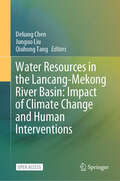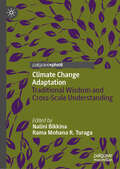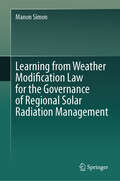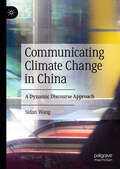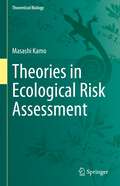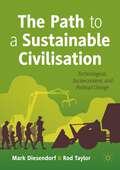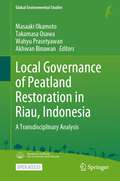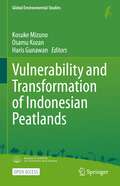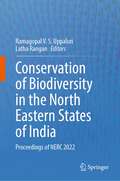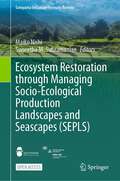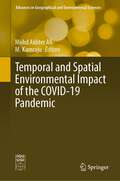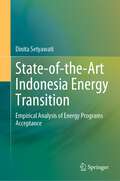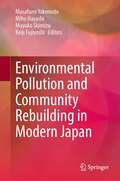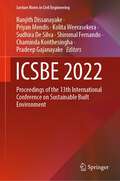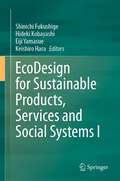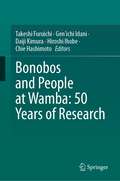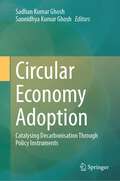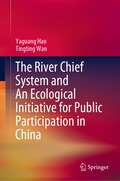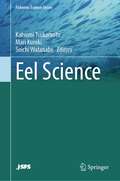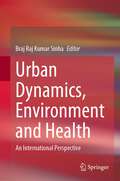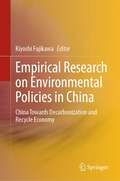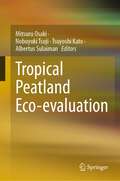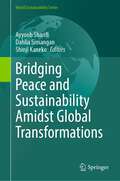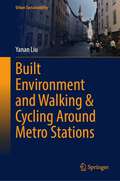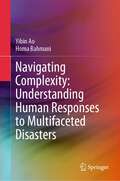- Table View
- List View
Water Resources in the Lancang-Mekong River Basin: Impact of Climate Change and Human Interventions
by Qiuhong Tang Deliang Chen Junguo LiuThis open access book provides a comprehensive, up-to-date picture of the current state of knowledge covering climate change, surface water change, arsenic pollution, water utilization, water-food-energy nexus, water related hazards, water management, and water governance in the Lancang-Mekong River Basin. Considering the widely concerned fact that the climate change and human intervention induced impacts on water will bring unprecedented threats to human societies and ecosystems, the book intends to support UN’s sustainable development goals through sustainable use of water by providing the most accurate and updated information on climate and water changes in a consistent way. Underlying all aspects of the book is a strong commitment to assessing the science comprehensively, without bias and in a way that is relevant to policy but not policy prescriptive. It can provide implications to support decision-makers and stakeholders for integrated water resources management and sustainable development at all levels.
Climate Change Adaptation: Traditional Wisdom and Cross-Scale Understanding
by Nalini Bikkina Rama Mohana R. TuragaThis book discusses how climate change needs to be anchored in indigenous knowledge with reference to resource management, infrastructure, livelihoods, and social institutions, with a unique focus on risks and provenances of resilience available to the local communities. Beyond the scientific know-how on climate change, this volume highlights traditional wisdom, which through its hands-on learning plays a crucial role in amalgamation with cross-scale understanding. It documents the deliberations of a seminar that brought together traditional wisdom and cross-scale understanding of academicians, researchers, practitioners, and grassroots functionaries directly or indirectly working with communities in the area of climate change adaptation and thereby brings together adaptation and allied practices from across a spectrum of specialties and practitioner contexts. It discusses several insights and novel practices and is purported to provide significant research and policy implications in the spirit of thinking globally but acting locally.
Learning from Weather Modification Law for the Governance of Regional Solar Radiation Management
by Manon SimonThis book investigates the role of cloud seeding laws in governing regional solar radiation management (SRM) activities. It challenges the prevailing belief that cloud seeding laws are irrelevant to regional SRM governance and argues for their applicability. Through case studies in Australia, Canada, and the United States, the book highlights the need for legal frameworks that promote cross-scale interactions, stakeholder participation, flexible decision-making, and conflict resolution. It advocates for adopting adaptive governance principles to effectively manage the risks and uncertainties associated with regional SRM interventions. By filling a gap in the existing literature, this book offers valuable insights and recommendations for the governance of regional SRM, shedding light on the potential of cloud seeding laws to inform and shape SRM governance frameworks. It provides a comprehensive analysis of the legal and normative aspects, offering practical guidance for policymakers, researchers, and stakeholders involved in regional SRM initiatives.
Communicating Climate Change in China: A Dynamic Discourse Approach
by Sidan WangThis book explores how China's media narrate climate policy and climate change. With the rapid growth of economy and carbon emissions, China has been seen as having a key role in addressingclimate change and receives substantial attention from the media. In theChinese coverage, climate change issues can be interpreted as various concernsand ideas involving the dimensions of the economy, energy and emissions, publicinvolvement, science and ecology, and responsibility. In this sense, a discourseapproach can be used to understand how the newspapers construct the climatechange discourse and discourse networks in the coverage. This study selectsthree different newspapers in China, namely People’sDaily, China Daily and Southern Weekend. This book will interest scholars of Chinese politics, environmentalists, and media studies scholars.
Theories in Ecological Risk Assessment (Theoretical Biology)
by Masashi KamoThis book introduces various mathematical models used in ecological risk assessment, primarily discussing models used in hazard assessment. The book aims to link ecology and conservation biology with risk assessments, bringing together the knowledge of ecotoxicology and ecology for effective risk assessment. The first part describes population-level assessment in ecological risk assessment. The chapters cover current methodologies for ecological risk assessment, individual-level assessment, population dynamics models for population-level assessment, case studies, mathematical models for population extinctions, the derivation of mean time to extinction (MTE) and their case studies. The second part of the book discusses the mathematical models involved in hazard assessments. It introduces the method of risk assessment using species sensitivity distributions (SSDs), hazard assessment of metals, chemical mixtures using the Michaelis-Menten equation, basic elements of statistics and related topics. Expected readers are risk assessors in governments and public sectors, students and young researchers interested in environmental science. The book is made accessible and easy to follow by beginners in mathematical biology and theoretical ecology.
The Path to a Sustainable Civilisation: Technological, Socioeconomic and Political Change
by Mark Diesendorf Rod TaylorThe Path to a Sustainable Civilisation shows that we have unwittingly fallen into an existential crisis of our own making. We have allowed large corporations, the military and other vested interests to capture governments and influence public opinion excessively. We have created a god called ‘the market’ and allowed our most important decisions to be made by this imaginary entity, which is in fact a human system controlled by vested interests. The result has been the exploitation of our life support system, our planet, and most of its inhabitants, to the point of collapse. This book argues that the way out of our black hole is to build social movements to apply overwhelming pressure on government and big business, weaken the power of vested interests and strengthen democratic decision-making. This must be done simultaneously with action on the specific issues of climate, energy, natural resources and social justice, in order to transition to a truly sustainable civilisation.
Local Governance of Peatland Restoration in Riau, Indonesia: A Transdisciplinary Analysis (Global Environmental Studies)
by Masaaki Okamoto Takamasa Osawa Wahyu Prasetyawan Akhwan BinawanThis open access book is one in a series of four volumes introducing peatland conservation and restoration in Indonesia. It focuses on local governance, in particular on regional and local perspectives in Riau, the most peat-destructed province of Indonesia. The book fills a vital gap in the existing literature that overlooks social science and humanities perspectives. Written by authors from different disciplines and backgrounds (including scholars and NGO activists), the approaches to the topic are various and unique, including analysis of GPS logs, social media, geospatial assessments, online interviews (conducted due to the Covid-19 pandemic), and more conventional questionnaires and surveys of community members. The chapters cover an interdisciplinary understanding of peatland destruction and broadly offer insights into environmental governance. While presenting combined studies of established fieldwork methodologies and contemporary technology such as drones and geospatial information, the book also explores the potential of long-distance research with rural communities through online facilitation, which was brought about by Covid-19, but that may have longterm implications. Readers will gain a comprehensive understanding of the complexities surrounding peatland conservation and restoration and recognize the significance of locally inclusive approaches that use contemporary but accessible technologies to sustainably govern the globally important resource of peatland. That approach would be useful for other environmentally fragile but important regions and give some ideas to achieve the United Nations’ SDGs for 1)No Poverty, 5)Gender Equality, 13)Climate Action, 15)Life of Land.
Vulnerability and Transformation of Indonesian Peatlands (Global Environmental Studies)
by Kosuke Mizuno Osamu Kozan Haris GunawanThis open access book deals with restoring degraded peatlands to help mitigate global warming, to which SDG 15 and SDG 13 are directly related. The book analyzes peatland degradation and restoration of the Indonesian peatland ecosystem through the integrated lens of resilience, vulnerability, adaptation, and transformation. It sheds light on what constitutes "resilience" of the peat swamp forest, digs deeper into local knowledge in developing the studies on institutions, governance, and ecological conditions that support the resilience of the peat swamp forest to elaborate on the idea of transformation in today's degraded peatlands. While peat swamp forests may be resilient, they remain highly vulnerable. The book analyzes restoration efforts through rewetting, revegetation, and rehabilitation of the local livelihoods with the concepts of adaptation and transformation. The integrated analysis covers fieldwork of more than a decade and various aspects such as agrarian and social changes, biological changes (birds, mammals, and termites), carbon emission, water control, timber use, revegetation efforts, and the Indonesia Sustainable Palm Oil (ISPO) program implementation. It also employs the ideas of vulnerability, resilience, adaptability, and transformation based on expanded studies on peatlands and observations of and participation in multiple efforts to prevent fires and restore the degraded peatland by researchers, the government, non-government organizations (NGOs), private companies, and last but not least, the local people. The discussion includes the period of pre-degradation and several efforts at peatland restoration for a better understanding and analysis of the long-term peatland dynamics.
Conservation of Biodiversity in the North Eastern States of India: Proceedings of NERC 2022
by Ramagopal V. S. Uppaluri Latha RanganThis volume presents part of the proceedings of NERC 2022, with an emphasis on conservation of bio-diversity in North-east India. This is a highly challenging and involved topic due to regionally diverse physiographic, geographical and eco-climatic conditions. Henceforth, systemic and holistic frameworks are required to disseminate upon the potential of science and technology for the conservation of the region’s bio-diversity. Notable among these frameworks refers to plant, microbial and animal bio-diversity conservation, value-added product development and sharing the benefits of such research for the perspective of bio-prospects, analysing critical environmental and climatic factors and their sensitivity upon urbanization strategies. Tools that are to be deployed for such insights involve plant, animal, and microbial bioscience and biotechnology, generalized rules for product design and development and survey based strategies. Addressing relevant competent methodologies and generic pedagogies, this volume on the bio-diversity conservation in North-eastern states of India aims to demonstrate the potential of pragmatic strategies that can be applied for the bio-diversity conservation in any region of world. Thereby, opportunities for nature linked livelihood security can be sought for the long term wellbeing of the humankind and ecology.
Ecosystem Restoration through Managing Socio-Ecological Production Landscapes and Seascapes (Satoyama Initiative Thematic Review)
by Maiko Nishi Suneetha M. SubramanianThis open access book is a compilation of case studies that provide useful knowledge and lessons that derive from on-the-ground activities and contribute to policy recommendations, focusing on the relevance of social-ecological production landscapes and seascapes (SEPLS) to ecosystem restoration. Building on the concept of SEPLS, the Satoyama Initiative promotes landscape approaches as integrative area-based strategies to bring together diverse stakeholders aiming to balance multiple objectives, including conservation and development, for the benefit of biodiversity and human well-being. Many of the SEPLS case studies from the International Partnership for the Satoyama Initiative (IPSI) offer rich evidence to help guide restoration efforts while advancing relevant knowledge and practices. The book highlights how the efforts in managing SEPLS can contribute to ecosystem restoration and sustainable development, looking at the strategies and approaches by which multiple stakeholders express, negotiate, and embrace their plural value perspectives of nature to restore ecosystems within a landscape or seascape. It begins with an introductory chapter followed by twelve case studies and a synthesis clarifying the relevance of the case study findings to policy and academic discussions. This book will be of interest to scholars, policymakers and professionals in the field related to sustainable development, especially on SDGs 15 and 17.
Temporal and Spatial Environmental Impact of the COVID-19 Pandemic (Advances in Geographical and Environmental Sciences)
by Mohd Akhter Ali M. KamrajuThis book identifies, evaluates and reports the impacts of the COVID-19 pandemic on the physical, biological and socioeconomic environment, using the science and technology of geoinformatics. It encourages the environmental considerations in the future city and policy planning and decision-making. For example, according to the World Health Organization, 80% of people living in cities are exposed to polluted air that exceeds healthy levels. City planners have applied the developing concepts of sustainability to modern debates over how cities and regions should be reviewed, regenerated and reformed since the introduction of the concept in developmental science. During the COVID-19 pandemic, a remarkable drop in air pollution has been observed in India and other countries, which has accelerated the shift to green and sustainable development. Geoinformatics can provide solutions and resources for local, sustainable activities in education, health, sustainable agriculture, resource management and related fields. This book serves researchers in a variety of areas, including hazards, land surveys, remote sensing, cartography, geophysics, geology, natural resources, environment and geography.
State-of-the-Art Indonesia Energy Transition: Empirical Analysis of Energy Programs Acceptance
by Dinita SetyawatiThis book discusses how people can come together to address current energy justice and access poverty problems by examining the relationship between energy systems and society in diverse energy sources. The novelty of this book is that this is the only complete guide for readers who wish to understand the status of Indonesia’s energy transition and renewable energy development. Energy programs that are explored are the ones prioritized by government administrations, including coal, nuclear power, solar energy, green electricity, and geothermal energy. Based on extensive fieldwork and empirical data, the book combines insights from historical data on energy subsidies and economic diversification, current empirical data on social acceptance of new energy technologies, and contemporary studies that forecast the implications of the transition to the coal industry and fossil fuel subsidies. It asks how Indonesia has enacted policies that support energy transition. How do the public and civil society view those policies? What are the implications for broader themes and discussions on energy sources, technology, systems, policies, and service? Strategies are suggested to advance a sustainable transition in the developing world that will mitigate developmental risks associated with the transition away from fossil fuels while encouraging decision making in a sustainable and socially just manner. This book is an informative and engaging read for a general audience as well as a valuable resource for scholars, researchers, and students in environmental and energy studies.
Environmental Pollution and Community Rebuilding in Modern Japan
by Masafumi Yokemoto Miho Hayashi Mayuko Shimizu Keiji FujiyoshiThis book describes how modern industry affected people in Japan and their communities by polluting their living environment with toxic emissions. It also shows how the populace endeavored not only to restore their once-clean environment but also to rebuild communities that had been damaged by pollution and its accompanying effects. Environmental pollution is usually referred to in Japan as kogai, public damage, meaning that such pollution not only harms the physical environment—air, water, soil, and the human body—but also destroys the social and personal relationships in the polluted area. Those people who took action recognized that industrial and economic development had been given the highest national priority even at the cost of their health and welfare. In this sense, anti-kogai movements led them to alternative community development and to rethinking what kind of environment and community they wanted. This book also explores the efforts driven by residents in several parts of Japan after the middle of the twentieth century and the endeavors of museums and archives as a memorial to those who suffered from the pollution and for the prospect of a better society with a good environment.
ICSBE 2022: Proceedings of the 13th International Conference on Sustainable Built Environment (Lecture Notes in Civil Engineering #362)
by Ranjith Dissanayake Priyan Mendis Kolita Weerasekera Sudhira De Silva Shiromal Fernando Chaminda Konthesingha Pradeep GajanayakeThis book highlights the latest knowledge and innovations in the fields of civil engineering and construction industry striving for a sustainable built environment. It consists of high quality and innovative research findings selected from the proceedings of the 13th ICSBE 2022 under the themes of sustainable construction, urban green infrastructure and planning, rainwater harvesting and water conservation, high-performance concrete, indoor environmental quality and indoor plants, wind and hydro-power energy, waste and wastewater management for enhanced sustainability, impacts of climate change, carbon footprint, global climate model and landscaping, material flows and industrial ecology, sustainable materials, etc.
EcoDesign for Sustainable Products, Services and Social Systems I
by Shinichi Fukushige Hideki Kobayashi Eiji Yamasue Keishiro HaraThis 2-volume book highlights cutting-edge ecodesign research and covers broad areas ranging from individual product and service design to social system design. It includes business and policy design, circular production, life cycle design and management, digitalization for sustainable manufacturing, user behavior and health, ecodesign of social infrastructure, sustainability education, sustainability indicators, and energy system design. Featuring selected papers presented at EcoDesign 2021: 12th International Symposium on Environmentally Conscious Design and Inverse Manufacturing, it also includes diverse, interdisciplinary approaches to foster ecodesign research and activities. In the context of Sustainable Development Goals (SDGs), in particular SDG 12 (Responsible Consumption and Production), it addresses design innovations for sustainable value creation, considering technological developments, legislation, and consumer lifestyles. Further, the book discusses the concept of circular economy, which aims to develop circular business models for resource efficient society by taking advantage of digital technologies including artificial intelligence, internet of things, digital twin, data analysis and simulation. Written by experts from academia and industry, Volume 1 highlights sustainable design such as product and process design, collaborative design, sustainable innovation, digital technologies, design methodology for sustainability, and energy system design. The methods, tools, and practices described are useful for readers to facilitate value creation for sustainability.
Bonobos and People at Wamba: 50 Years of Research
by Takeshi Furuichi Gen'Ichi Idani Daiji Kimura Hiroshi Ihobe Chie HashimotoThis book reviews all the findings about bonobos and the local people of Wamba village in the Luo Scientific Reserve in the Democratic Republic of the Congo over the last 50 years. In 1973, Takayoshi Kano, a Japanese primatologist, traveled across a vast area of the Congo Basin with a bicycle and found Wamba village to be a promising site to start his first studies on wild bonobos. Since then, many researchers from Japan and all over the world have been working at Wamba, now the longest standing study site, to uncover various aspects of the ecology and behavior of this most recently identified great ape species. The researchers study bonobo behaviors and carry out various activities for the conservation of bonobos. They also conduct anthropological studies of local people who live with bonobos and believe them to be distant relatives from the same family, living in the forest. This book is published in commemoration of 2023 marking the 50th year of study. The main chapters are contributed by active researchers studying bonobos and the local people at Wamba. The book also includes contributions from various eminent researchers who have carried out short-term research or have supported research at Wamba, which helps place these studies of bonobos in a broader primatological or anthropological perspective. This book will be a useful resource for professional researchers in primatology and anthropology, as well as graduate or undergraduate students interested in these research fields.
Circular Economy Adoption: Catalysing Decarbonisation Through Policy Instruments
by Sadhan Kumar Ghosh Sannidhya Kumar GhoshThis edited book brings out a comprehensive collection of information on principle and policy of circular economy. It deals with the general principles, pathways of circular economic development in different countries, use of circular economy in achieving sustainable development goals. The book covers policy instruments that helps implementing resource efficient processes, strategies of implementing circular economy concepts, Decarbonisation, and developing business promoting circular economy principles. The circular economy has gained increasing prominence as a tool which presents solutions to some of the world’s most pressing sustainable development challenges. By addressing root causes, the concept of a circular economy, an economy in which waste and pollution do not exist by design, products and materials are kept in use, and natural systems are regenerated provides promise to achieving SDGs. This book is of interest and use to practitioners, capacity builders and policymakers, entrepreneurs, NGOs, general people, and valuable source of reference to the relevant researchers and students in global markets. As circular economy is gaining momentum and interest in general, the book serves as reading material for undergraduate and graduate students in any field specifically environmental science, waste management, medical science as well as environmental management at national and international level.
The River Chief System and An Ecological Initiative for Public Participation in China
by Yaguang Hao Tingting WanThis book provides an alternative agenda to deepening the understanding of the River Chief System as a distinctive responsibility approach to solve water pollution and associated governance dilemmas. Insightful analysis is performed through in-depth studies of the origins of China’s River Chief System, responsibility mechanisms, governmental and civil river chiefs, formal and informal water governing institutions, public participation, empowerment with accountability, and the environmental impact.
Eel Science (Fisheries Science Series)
by Katsumi Tsukamoto Mari Kuroki Soichi WatanabeThis book is a compilation of eel research and fish migration studies for more than 40 years showing the research history and recent advances in eel studies. Dr. Katsumi Tsukamoto, the esteemed editor of this book, has been actively involved in eel research as one of the leading scientists in the world for a long time, and he and his team successfully collected the fertilized eggs and spawn-condition adult eels from the wild for the first time in the world. This book compiles the essentials of the scientific findings obtained by the editor and his colleagues and reviews the latest references of eel science. Knowledge and information in the book such as a spawning area survey, research on artificial production of glass eels, the discovery of a new species, etc. will attract the reader’s interest, as these are written based on the authors’ experiences. Readers can obtain a comprehensive understanding of eels from various aspects of eel science including the cultural and socio-economic importance of eels and valuable scientific information using state-of-the-art approaches. The book also endeavors to contribute to the conservation of eel species, some of which have been classified as endangered by the IUCN and to promoting harmonious coexistence between humans and nature.
Urban Dynamics, Environment and Health: An International Perspective
by Braj Raj Kumar SinhaThe comprehensive volume focuses on spatial, temporal, conceptual and empirical approaches to various elements of urban dynamics, environment and urban health. It demonstrates a multidisciplinary account of the significant dimensions of urbanization and urban life. Chapters by leading international experts are presented in sections on urban dynamics, Urban Environmental Issues, Urban Health Problems and Urban Development, Planning and Policies. Each chapter provides a breadth of information on conceptual and empirical studies of urban issues. It enables the readers to understand the interconnections of various vital elements of each urban-related topical issue locally, regionally and globally. Extensive maps, charts, diagrams and tables as cartographic tools facilitate the reader’s understanding. It also outlines an action plan for policy program change in both the developed and less developed countries toward sustainable urban development and environment for better health, prosperity and quality of life of the present and future urban population. It is an indispensable reference for students, research scholars of geography and environmental, medical, and social sciences at undergraduate and postgraduate levels.
Empirical Research on Environmental Policies in China: China Towards Decarbonization and Recycle Economy
by Kiyoshi FujikawaThis book presents an empirical study of the effects of environmental policies on China and its neighboring countries, with a focus on waste and climate policies in China. The two major carbon policies have to do with carbon markets and renewable energy. The authors first examine the effectiveness of the Asian carbon market. Because of the consumption of goods beyond provincial borders, nationwide carbon markets are rather difficult to operate; therefore, a desirable initial allocation in the carbon market is proposed in this book. As for renewable power, its sources have not been fully utilized owing to a regional mismatch of supply and demand, so optimal locations of renewable energy are shown. The book also contains an analysis of the environmental and economic impacts of changes in resource circulation in East Asia. Although motorization is advancing rapidly, the vein industry for recycling used cars has not progressed. The authors estimate the amount of materials from used cars including new energy vehicles (electric and fuel cell vehicles) and propose desirable policies for used vehicles. East Asia is interdependent with respect to carbon and waste as well as the economy. China has regulated the import of waste recently and has started recycling its own wastes, putting pressure on neigboring countries to recycle their waste domestically. The authors estimate the environmental and economic impacts of such policy changes.
Tropical Peatland Eco-evaluation
by Mitsuru Osaki Nobuyuki Tsuji Tsuyoshi Kato Albertus SulaimanThis book focuses on eco-evaluation system monitoring and sensing, carbon-water modeling, mapping, and disaster prediction. It is the 3rd book on tropical peatland issues, following 1st "Tropical Peatland Ecosystem" and 2nd "Tropical Peatland Eco-management" publications. Tropical peatland is also a wetland, mangrove, and rainforest. With this nature, two major key elements of tropical peatland are water and forest. This book introduces the relationship and interaction among water, oxygen, and nutrients as well as aspects of the forest as the driving force of carbon stock and the carbon cycle. Eco-evaluation system is key to conserving, managing, and restoring tropical peatlands, however comprehensive system for Eco-evaluation in the Tropics is not yet established. This book reviews and proposes Eco-evaluation methods in the Tropics Ecosystem, focusing mainly on the peatland ecosystem and others, covering Social Capital such as Credit, Bonds, National Accounting, etc.
Bridging Peace and Sustainability Amidst Global Transformations (World Sustainability Series)
by Ayyoob Sharifi Dahlia Simangan Shinji KanekoThis book is the sequel to a well-received book titled ‘Integrated Approaches to Peace and Sustainability’ that aims to further advance the understanding of the dynamic interactions between various components of peace and sustainability. How are peace and sustainability linked to each other, and what are the key parameters that define the nexus between them? This book addresses those questions through a combination of theoretical studies and empirical research that contextualize peace and sustainability issues amid global transformations. The conceptual and empirical linkages between peace and sustainability are widely recognized in academic and policy circles. The adoption of the 2030 Agenda for Sustainable Development confirms this recognition. However, many of the initiatives on peace and sustainability operate in silos, undermining the positive and mutually reinforcing relationship between them. Enhanced integration of peace and sustainability components is imperative for addressing complex challenges that come with global transformations that are manifested environmentally, socially, politically, and economically across levels. It is, therefore, crucial to identify the pathways that enhance the peace-promoting potential of sustainability and the sustainability-promoting potential of peace. The contributions in this edited book elaborate on such pathways by offering insights related to different social, economic, and environmental aspects of the peace-sustainability nexus. Given its inter- and trans-disciplinary focus, the book is of interest to policymakers and researchers working in different areas of peace and sustainability. It contributes to ongoing academic and policy discussions surrounding the outcomes of and challenges to achieving the Sustainable Development Goals (SDGs), particularly SDG 16 on peace, justice and strong institutions.
Built Environment and Walking & Cycling Around Metro Stations (Urban Sustainability)
by Yanan LiuThis book explores the relationship between pedestrians/cyclists’ mode and route choice to/from metro/railway stations and the micro-level (street-scale) built environment in a second-tier city in China. More specifically, it investigates how the street-scale built environment influences pedestrians/cyclists’ mode choice and route choice behavior and examines user preferences for the micro-level built environment around metro stations. The focus on a second-tier city is motivated primarily to expand the set of Chinese cities where the effects of the built environment on pedestrian/cyclist mode and route choice have been studied. Results demonstrate the effects of the street-scale built environment on pedestrian flows. The effects are higher for the main road, which is directly connected with the metro station. The findings of this book are expected to support the design of preferred walking/biking built environments around a metro station. This book appeals to urbanists, planners, engineers, policy makers, and those interested in a wide-ranging overview of slow/green transportation and built environment promotion. These methods not only help to understand the quantitative relationship between built environment design and travel behavior but also support the evaluation and assessment of built environment design in urban planning projects. It reduces the gap in our understanding of the quantitative relationship between the micro-level built environment and pedestrians/cyclists’ transportation mode and route choice around the metro station. Both stated choice data and revealed choice data were used. An extended set of micro-level built environment attributes was developed. Besides the widely studied transportation-related factors, street-level built environment factors were studied using quantitative methods.
Navigating Complexity: Understanding Human Responses to Multifaceted Disasters
by Yibin Ao Homa BahmaniThis thought-provoking book unravels the intricate interplay between human behavior and disasters, weaving a rich narrative that transcends traditional boundaries. Embark on a captivating exploration of human responses to multifaceted disasters with this book. Unveiling the human psyche and the intricate web of emotions that intertwine with disaster events, this book offers a profound understanding of human responses to multifaceted disasters.Written with precision and meticulous research, this book captivates scholars, practitioners, and policymakers alike. Its multidimensional perspectives offer valuable insights for disaster management, urban planning, sociology, and public health, transcending disciplinary boundaries.
